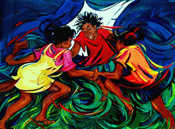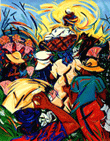|
stories told in brush strokes
By Allison Hersh - for the Savannah Morning News
Artist Charlotte Riley-Webb remembers vividly learning how to bake yeast rolls with her beloved grandmother. As each of the granddaughters turned 10, her grandmother would teach the young girls her secret recipe.
"It was sort of a rite of passage," Riley-Webb recalls. "It was during the time that the yeast rolls were rising that grandma shared. We learned values and principles of home and family and how to carry ourselves like 'good Christian' young ladies. I question if children have those experiences any more. Are we raising them on canned biscuits and are they receiving their time of sharing, their rite of passage?"
In a lush, evocative painting titled "Giving the Yeast Rolls Time to Rise," Riley-Webb captures that magic in the kitchen with her grandmother as she learned about baking, and life, from her family's matriarch. Wearing a bright turquoise apron, her grandmother leans over a pan of dough, surrounded by her transfixed granddaughters as the kitchen swirls around them in a timeless dance of color.
"Stories of Your and My America," on display at the Beach Institute through July 20, features 20 paintings by Atlanta-based artist Riley-Webb that celebrate the lost art of storytelling through vibrant paintings that document African-American history. From African dance to Northern migration, Riley-Webb taps into the heart, soul and spirit of African-American experience. "The song of survival has been sung for so many decades and through so many challenges," she explains.
Using a bright palette and curving brush strokes that suggest frenetic energy and fluid motion, Riley-Webb stimulates the eye in every painting. "My painting style is distinct in that I attempt to engage as many of the viewer's senses as possible in each piece," she says.
Music serves as a powerful recurring theme in "Stories of Your and My America," as the artist celebrates jazz, blues and folk music. "Each painting flows with an imaginary tune capturing the rhythms and the richness of 'magenta jazz' and the sorrow of 'blues blue,'" she explains. In "Ben Played Bass in the Background," a striking oil on canvas, Riley-Webb paints Savannah jazz patriarch Ben Tucker jamming in a fantasy jazz session at a local club with B.B. King, Miles Davis and other musical legends. She depicts Tucker's body and standing bass blending into one harmonious whole, celebrating the seamless fusion of the man and his music.
Part of what makes Riley-Webb's paintings so powerful is her sensitivity to, and insight into, the African-American experience, combined with her flair for abstraction.  In "The Checker Players," she is less concerned with the realistic details of a heated game of checkers than she is with the energy of the showdown. She paints an electrifying checkers match in which the board curves and warps like butter on a hot pan as pale chartreuse, luminescent turquoise and lemon yellow brush strokes swirl around the players to convey the energy of the game. The painting is based on a weekly checkers game that Riley-Webb observed in a back room at a local hardware store. "The days slipped unnoticed into night," she recalls, "the days into months, then years. They'd argue, cheat and lie. Smitty would yell, 'Move, man!' Hank would growl under his breath and remind him that he had nowhere to go." In "The Checker Players," she is less concerned with the realistic details of a heated game of checkers than she is with the energy of the showdown. She paints an electrifying checkers match in which the board curves and warps like butter on a hot pan as pale chartreuse, luminescent turquoise and lemon yellow brush strokes swirl around the players to convey the energy of the game. The painting is based on a weekly checkers game that Riley-Webb observed in a back room at a local hardware store. "The days slipped unnoticed into night," she recalls, "the days into months, then years. They'd argue, cheat and lie. Smitty would yell, 'Move, man!' Hank would growl under his breath and remind him that he had nowhere to go."
Playful paintings like "Joy in the Midst" and "A Pocket Full of Posies" depict little girls playing games outside, oblivious to sheets drying on clotheslines and the rundown shacks in the background. "When there was something not quite right going on at the home or neighborhood, we were sent outside to play," Riley-Webb recalls. "We took full advantage of this opportunity. When we tired of the board games sprawled across the porch, we filled the yard with creative play and laughter." clotheslines and the rundown shacks in the background. "When there was something not quite right going on at the home or neighborhood, we were sent outside to play," Riley-Webb recalls. "We took full advantage of this opportunity. When we tired of the board games sprawled across the porch, we filled the yard with creative play and laughter."
Some of Riley-Webb's most powerful paintings deal with bittersweet observations about African-American history. In "Enigma of a Rose Garden," she paints strong, beautiful women in African clothing picking snow-white cotton by hand, tucking it into woven baskets as rich red roses loom in the foreground of the image, physically and symbolically out of reach. "Rituals," a mixed-media piece that combines cut-out pieces of African fabrics with acrylic paint, depicts wide-hipped women dancing joyfully with baskets balanced atop their heads.
 "Walking North" portrays a symbolic and literal exodus as men and women walk through thick green foliage, carrying babies on their backs and children in their arms. "These pieces freeze time and help us to trace the course of history and the dangerous pathway to freedom," she explains. "They speak to the snags and misnomers along the way. Even though their hearts and souls were often off-center, they still kept walking north." "Walking North" portrays a symbolic and literal exodus as men and women walk through thick green foliage, carrying babies on their backs and children in their arms. "These pieces freeze time and help us to trace the course of history and the dangerous pathway to freedom," she explains. "They speak to the snags and misnomers along the way. Even though their hearts and souls were often off-center, they still kept walking north."
"Stories of Your and My America" focuses upon commonalities in African-American experience, celebrating shared stories and universal experiences. From ancestral dances to modern-day games, Riley-Webb recreates the timeless rituals that connect people across space and time, creating paintings that dare to dance, sing and remember
|